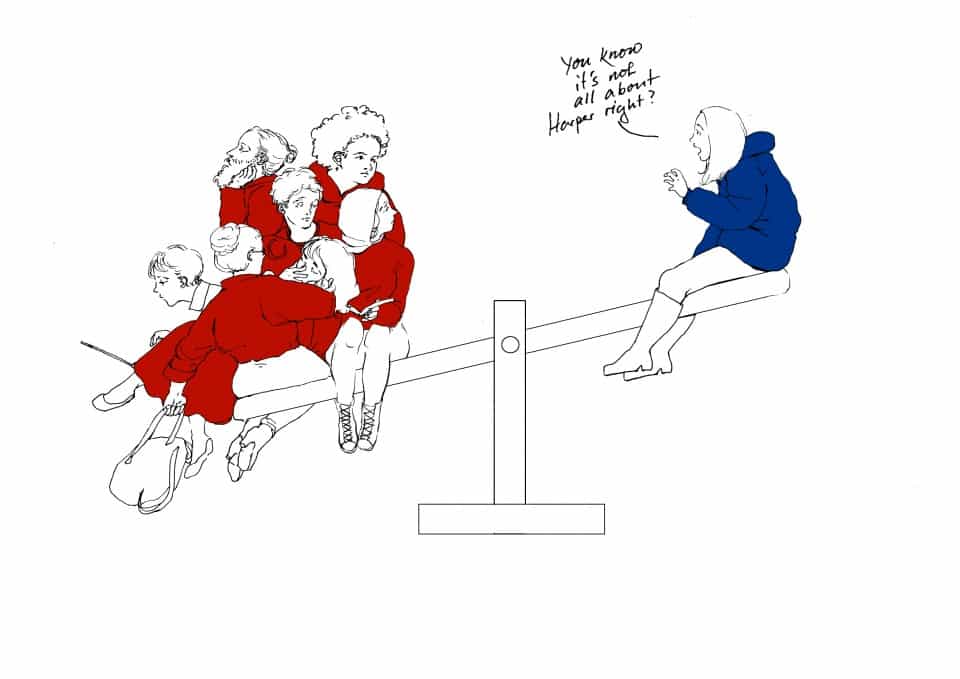[dropcap]To[/dropcap] the casual observer of Canadian politics, it would seem that on October 19, our country underwent a seismic societal shift worthy of the Revelations. The public roared with delight as the Second Coming of Trudeau toppled Harper’s Conservatives from an almost decade-long grip on power.
Unfortunately, this discourse of triumph has demonized the Conservative Party and distracted many from the positives of conservatism. Indeed, the biggest sources of information among young voters — the Internet and television — are crammed with Tumblr facts, buzzwords, and easily-digestible talking points that all seem to point to one stereotype: Conservatives are either overly religious gun lovers, or corporate businessmen driven by greed. Liberals, on the other hand, are on the ‘right side of history’. In other words, Right is wrong, and Left is right.
It is easy to see why conservatism has fallen out of favour with youth, considering the prejudices perpetuated by those who don the ‘conservative’ mantle (see ‘niqab debate’). It is important, however, to recognise that the Glenn Becks of this world are not so much conservatives as they are con artists.
Conservatism, in its boiled-down philosophical form, often has little to do with the political parties claiming the word on the democratic stage. The nature of electoral politics in most Western democracies force ideologically similar, albeit distinct, varieties of conservatism together. This results in a monolithic political bloc ( essentially, the Conservative Party of that democracy). Conservatism’s essential spirit, however, is a simple set of ideas that stress the importance of personal freedom and tradition. It advocates for a healthy scepticism of radical ideas, and rejects utopian, idealistic solutions in favour of those founded on experience-based evidence. Conservatism is not so much about orthodoxy as it is incrementalism: small steps forward guided by empirical results.
[pullquote]Conservatism is not so much about orthodoxy as it is incrementalism: small steps forward guided by empirical results.[/pullquote]
Perhaps one explanation for conservatism’s failure to attract young people can be found in the semantic associations with the name. ‘Conservative’ has become associated with a whole range of words from ‘redneck,’ to ‘inflexible,’ to ‘unimaginative.’ Since the counter-cultural movements of the 60’s and 70’s, many young people have created an identity around the bohemian, the rebellious, and the unorthodox – all words with strong connotations to the term ‘liberal.’ Yet, the philosopher Roger Scruton makes an excellent point when observing that the free-spirit rebellion of liberalism appeals to youth culture, the media they consume, campus culture, and environment essentially espouse the same beliefs. Considering this, how unorthodox can young liberals really be?
What students often ignore is that anti-establishment ideologies are founded on the belief that their followers are the sole holders of truth – the ‘anointed ones,’ as Thomas Sowell once mockingly wrote. The problem with this is the fact that so-called truth-sayers become blind to other ideas, arrogant in their ability to lead the way. Indeed, history shows that the ideological motor for colonial atrocities were ‘enlightened’ social engineers trying to export liberal ideas such as democracy, Parliament, and legal codes to indigenous communities.
The reasoning behind preserving their existing traditions are, in fact, much more in line with conservative thinking than with liberalism. This is because conservatism is based on the belief that a government has limits to what it can accomplish. It rejects massive centralized bureaucracies with little connection to a state’s disparate communities in favour of local governance, which is better informed from hundreds of years of on-the-ground experience.
While radicals may have good intentions, a blind faith in utopia and categorical eschewal of the existing system often devolves into nihilism, which provides no real direction towards creating a progressive solution. If anything, such attitudes will bring down institutions that have kept our society and identities stable for so long.
The youth set to inherit society need to realize that the counter-culture has become the dominant culture, and that one should not always replace the traditional with what merely sounds best. Conservatives need to reconnect their values with those of the youth, and an important first step is to stop the smear campaign set against the very idea of Conservatism and conservatives. Politics are not a battle between the right and wrong, or the progressive versus the bigoted. It is time for the media to stop ostracizing and to start recognizing that both conservatism and liberalism are necessary pendulums to keep the clockwork of Parliament from swinging too far in either direction.
Jeffery Chen is a third-year student at Trinity College studying English and European studies. His column appears every three weeks.


